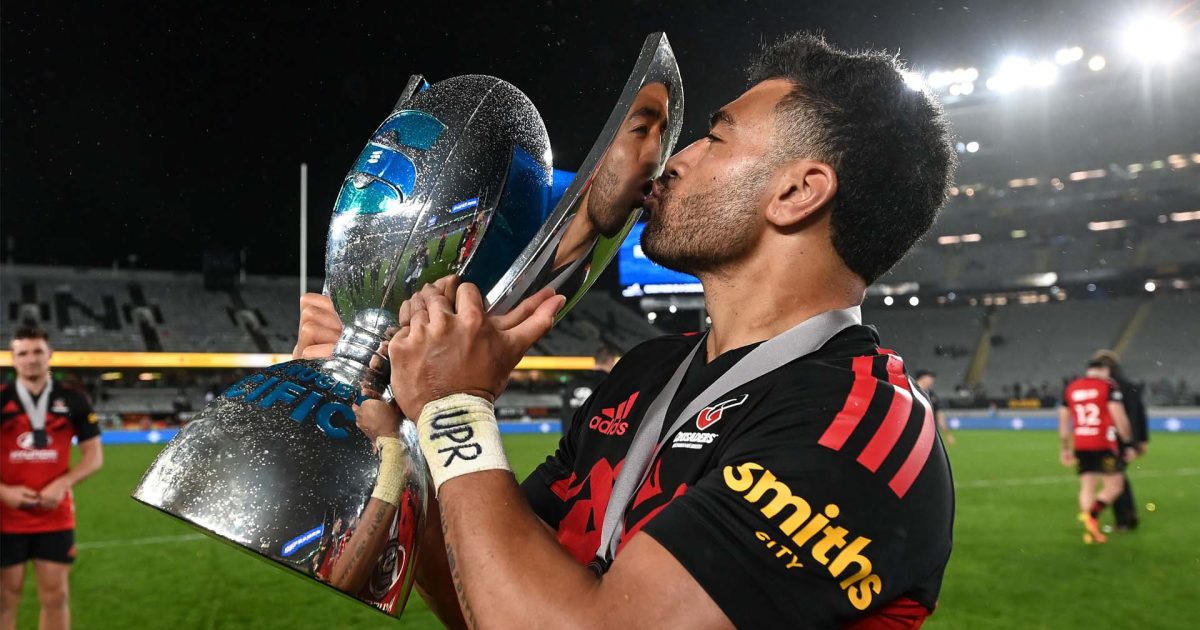Scott Robertson applauds last-ever performance of Crusaders halves partnership

It may have been the work of the Crusaders at the set-piece that really undermined any chance of the Blues scoring a victory in the Super Rugby Pacific final on their home turf, but the work of well-oiled halves pairing Bryn Hall and Richie Mo’unga didn’t go unnoticed by senior Crusaders figures.
With the Crusaders dominating their opposition at the lineout throughout the match – forcing the Blues the operate with a less than 50 per cent success rate at the crucial set-piece – the Blues struggled to put their opposition under any long-term pressure throughout the match.
In the best-case scenario, the Blues were playing with scrappy ball. More often than not, however, the Crusaders were able to wrestle possession off the home side and Hall and Mo’unga were happy to pin the Blues back with some expertly placed kicks.
Mo’unga was at his effervescent best on attack throughout the 21-7 win, scooping up balls left, right and centre and then jinking his way around defender after defender to always keep the Blues on their toes – even picking off ball at the back of mistimed Blues lineouts.
“Richie’s one of the leaders within the group and when there’s a ball on the ground, you saw what it means to him, to sprint and put his body on the line to take that,” Crusaders captain Scott Barrett said following the victory at Eden Park. “That was a pretty big moment [when Mo’unga grabbed one dropped ball of a lineout]; the Blues were just getting a bit of momentum with the time on the clock.
“Just little things like that, he’s so big for this team and pretty lucky to have the likes of Rich, Davey (Havili), Sam (Whitelock) – I could rattle off so many leaders in this group that make my job and [coach Scott Robertson’s] easy.”
“He’s got so much time,” added Robertson. “You thought he was going to get tackled four or five times and he dummied instead. Tactically that’s probably his point of difference.
“He missed one kick but everything out of hand [was good], defensive efforts, he’s pretty special – he’s world-class.”
Hall contributed to the onslaught in his own was, including one memorable box kick down the field from a sudden Crusaders turnover that pushing the ball deep inside Blues territory, and then throwing a beautiful tunnel ball between his legs on the next phase of possession to give the Crusaders ample quick ball from which to launch another attack (which, with some more clinical operators further out, likely would have result in try to the Cantabrians).
“Bryn’s been incredible in the last six years for us,” said Robertson. “[He’s] the ultimate competitor, isn’t he? Each week he turns up and he’s meticulous in the way he looks and the way he trains and the way he prepares. He’s just a great man for us.”
Having kicked off his career with the Blues back in 2013 but was eventually cut loose from the team by former coach Tana Umaga in 2016, with the Blues choosing to persevere with Augustine Pulu, Billy Guyton and Sam Nock instead. Hall was picked up by the Crusaders and one year later, helped the team to their first Super Rugby title under Scott Robertson.
Saturday night’s victory marked Hall’s sixth title in as many years and now the 30-year-old will be taking his talents to Japan.
“It comes time [to leave],” Robertson said of his halfback’s impending departure. “Everyone’s got their reasons for it.”
Without Hall in the No 9 jersey, the Crusaders will still be able to call on Mitchell Drummond, who’s contracted with the side for two more seasons – but the Super Rugby Pacific champions will still feel Hall’s departure. After all, there’s good reason why he’s started 11 matches to Drummond’s five for the Crusaders this year, despite the two halfbacks typically sharing the load evenly in recent season.
Fortunately for the Crusaders, Mo’unga still has at least one more year to run on his contract – which means the Cantabrians will have as good a chance of taking home the title next year as any other team.










































































